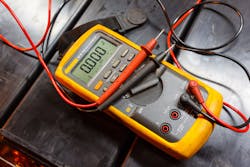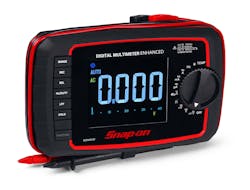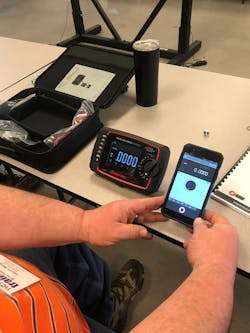Get Certified: The Proper Usage and Safety of Multimeters
The multimeter is a powerful diagnostic tool used by many technicians. Industrial, power generation, agriculture, aviation, and numerous other fields use them to determine whether critical devices are functioning properly.
Even so, they vary in ability and scope, and finding the proper multimeter for the job is just as important as having the multimeter itself.
Choosing the proper tool, like a multimeter, can change the way you work. Without the right tool, you aren’t able to do a thorough job and that can lead to missed errors or even compromise safety.
Similarly, if you have the proper tool but are not aware of all its capabilities, your work is hindered and you may not receive the full scope of what’s occurring with a component’s electrical system.
In either scenario, work and safety suffer.
With all the multimeter options, finding one that suits your exact needs is essential. Each industry and field require very specific multimeters.
To fully understand what type of multimeter you need, and subsequently to learn about all its capabilities and work efficiently and safely, the best option is to be trained and certified in multimeter usage.
Improved Technology
Multimeters have been used for decades, and while the traditional style was adequate, technicians wanted a better user interface—a device that was larger could display numerous results and was easier to hold, and is easy to read in darker conditions.
Recently, four-inch color display screens that are oriented horizontally (landscape) have been introduced that make data easier to read while still providing robust diagnostics suitable for a wide variety of industries.
New meters not only have a larger screen but they have Bluetooth capability so many features can be controlled and read from a smart device. This technology is handy in many situations.
For example, if you’re trying to determine if the brake lights on a tractor-trailer are working, you need to monitor the voltage at the back of the trailer. Without Bluetooth, you would have to connect the multimeter in the back, walk to the front of the vehicle to step on the brakes to check the voltage, and then walk back to view the multimeter.
Not very practical.
With Bluetooth technology, the meter can be at the back of the trailer tractor, but the user can see the readings on their smart device right in the cab. New multimeters also graph the data and give you the ability to capture a screenshot so you can send that information to someone immediately.
This technology not only provides an easier way to test, but it enhances communication, as well.
Multimeter Usage and Safety Improve With Certification
As tools become more advanced, they're still only as effective as the technician using them. If you don’t understand all of the capabilities of the tool, you're limiting the effectiveness of their work.
Very often, it's not that a technician wants to ignore the functions of their multimeter, they simply have never been fully trained to use it properly. By going through certification, a technician can not only learn every function of their meter, but the training can help them advance their career.
The goal of tooling certifications is to not teach how a vehicle operates or how an aircraft flies, rather its interest lies in teaching technicians the proper and best way to use tools and equipment, such as multimeters, to become more productive in their jobs.
The certifications provide conformity and an across-the-board standard for the partnering colleges and schools to teach in-depth instruction on tool use, as well as theory and application.
Upon completion of these courses, technicians become certified in the proper use of tools and equipment making them more productive and well-rounded professionals. The certifications are not an add-on, but rather, are integrated into the existing courses offered by partnering schools.
Becoming certified in multimeters ensures that the technician understands how to set up the meter, and connect and evaluate the meter readings properly. At times, technicians might get an erroneous reading only because they didn’t know how to properly connect it. They might skip important steps completely because they aren’t sure what those steps do.
They could be maximizing the meter to its full potential, but instead are using only the most basic functions.
For example, certification teaches the four CAT (electrical measurement categories) ratings and explains which is best for a particular job. When dealing with electricity, one must understand that a multimeter is either designed for a particular application or it’s not.
Trying to use a multimeter that isn’t suitable for the task can cause serious problems. If the multimeter is connected incorrectly, it could lead to arc flash and that is extremely dangerous to the technician, as well as the device they are testing. By understanding the four primary CAT ratings, the user can more accurately and safely operate the meter.
Safety is a high priority for all industries and organizations, so having employees receive certification increases overall safety while reducing the chance of unnecessary injuries. Certification assures both employer and employee understand all facets of meter use and application.
To help facilitate multimeter certifications, Snap-on has partnered with the National Coalition of Certification Centers (NC3), a network of education providers and corporations that support advances and validates new and emerging technology skills within the transportation and industrial markets.
Typically, the curriculum for multimeter certification is integrated into a school’s course of study. As specific disciplines are taught throughout a student’s career at the college, they are tested on the material. Students who pass receive certification in multimeters.
Certifications on other tools and equipment are also available. The benefit to students accumulating certifications is that when they graduate and begin applying for jobs, they’ll have a leg up on the competition by being fully trained in specific tools and equipment.
Whatever job you’re doing, choosing the right tool and learning how to use it properly can make work easier and safer. Multimeter certification trains technicians on how to choose the right tool, use all its capabilities, and keep maintain safety.
For more information on multimeter offerings and certifications call (877) 740-1900, or visit https://www.snapon.com/Industrial-Certification
About the Author
Earl Bailey
National Education Partnerships Coordinator - Snap-on Industrial
Earl Bailey is the National Education Partnerships Coordinator for Snap-on Industrial.



